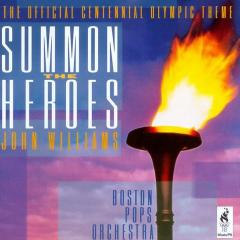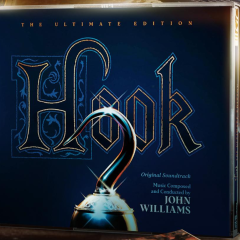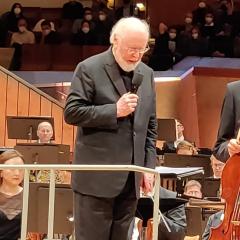
Locrius
-
Posts
131 -
Joined
-
Last visited
Reputation Activity
-
 Locrius reacted to Timo Martikainen in John Williams & Berliner Philharmoniker 14th/15th/16th Oct 2021
Locrius reacted to Timo Martikainen in John Williams & Berliner Philharmoniker 14th/15th/16th Oct 2021
Quote from https://www.deutschegrammophon.com/en/artists/john-williams/news/john-williams-conducts-the-berliner-philharmoniker-for-the-first-time-on-the-berlin-concert-264911 :
-
 Locrius reacted to BB-8 in John Williams & Berliner Philharmoniker 14th/15th/16th Oct 2021
Locrius reacted to BB-8 in John Williams & Berliner Philharmoniker 14th/15th/16th Oct 2021
It's out for pre-orders...
-
 Locrius reacted to BB-8 in John Williams & Berliner Philharmoniker 14th/15th/16th Oct 2021
Locrius reacted to BB-8 in John Williams & Berliner Philharmoniker 14th/15th/16th Oct 2021
3 redundant Audio CD titles found on amazon.de:
John Williams in Berlin - Limited, 2022 The Berlin Concert, 2022 John Williams in Berlin, 2022
all Deutsche Grammophon, 1-4 discs
no images, currently not available
-
 Locrius reacted to BB-8 in John Williams & Berliner Philharmoniker 14th/15th/16th Oct 2021
Locrius reacted to BB-8 in John Williams & Berliner Philharmoniker 14th/15th/16th Oct 2021
Now looking at it, a DG CD and/or CD/Bluray release would still be better than this on-demand edition hanging around in the clouds and us guys having to rip, edit and design our own souvenirs.
-
 Locrius reacted to bollemanneke in John Williams & Berliner Philharmoniker 14th/15th/16th Oct 2021
Locrius reacted to bollemanneke in John Williams & Berliner Philharmoniker 14th/15th/16th Oct 2021
They'd better not remove anything he said.
RED ALERT I THINK IT IS UP IN DIGITAL CONCERT HALL
-
 Locrius reacted to SteveMc in The John Williams Concert Work Listening and Discussion Thread
Locrius reacted to SteveMc in The John Williams Concert Work Listening and Discussion Thread
Elegy For Cello And Orchestra (1997)
Williams wrote this piece out of tragedy, the death of the children of a violinist he was acquainted with. The work is classical in nature and structure, definitely lyrical and romantic in style, directly lifting a secondary theme from his film score Seven Years In Tibet and putting the heartfelt melody through development and soloist motion.
The overall effect is quite beautiful and more overt and immediate than perhaps all of Williams's concert works.
Originally, the work was written and performed for cello and piano. It feels quite different here, perhaps a bit more pained and focused than the richer orchestral version.
A couple of performances of this iteration are here:
Williams expanded the piece for full orchestra and recorded it with Yo Yo Ma in 2002, with this becoming the definitive version of the piece. It is remarkably lush, yet restrained.
This is one of Williams's works that will probably find itself permanently in the regular repertoire.
-
 Locrius got a reaction from Matt S. in John Williams & Berliner Philharmoniker 14th/15th/16th Oct 2021
Locrius got a reaction from Matt S. in John Williams & Berliner Philharmoniker 14th/15th/16th Oct 2021
Whoa, you're right... I never realized before that he changes the key in the ANH version at that spot (and so masterfully and quickly!).
EDIT: There's also a slight difference in the trumpet triplets leading up to the Rebel fanfare; in ANH, the last triplet goes down for the second note and then back up, whereas TESB is a continuous upward motion.
-
 Locrius got a reaction from Matt S. in John Williams & Berliner Philharmoniker 14th/15th/16th Oct 2021
Locrius got a reaction from Matt S. in John Williams & Berliner Philharmoniker 14th/15th/16th Oct 2021
Good catch! Also note the difference in key, which I just pointed out in my edited comment. So the Slovak recording is especially unique, because it is the original key, but with the trombones. Trombones are never heard playing the theme in that key in any of the films' credits; all the later films that have the trombones doing it, are up a step.
Now that I think about it, it's really interesting how JW chose to do the concert version of the piece, because he both started in the original key as heard in the film, and then shifted up into the key of the other films' credits for continuity (and it just sounds more "right" that way, since every other time we've heard the credits it's been in this other key).
He got the best of both worlds in that arrangement; your ears aren't thrown off by starting in a different key, and they also aren't thrown off by hearing the credits in a weird key you're not used to. Really well-done.
-
 Locrius reacted to Matt S. in John Williams & Berliner Philharmoniker 14th/15th/16th Oct 2021
Locrius reacted to Matt S. in John Williams & Berliner Philharmoniker 14th/15th/16th Oct 2021
I don't think I ever consciously thought of the keys before (I'm looking at my Signature Edition score right now). What's crazy is that, almost immediately, the keys change and the different versions align. As the "credits" music begins, the OST plays the theme in D-flat major while the concert version is in E-flat. The theme is played once, followed by a single bar flourish that leads into the Rebel theme. By the time the Rebel theme hits, both versions are in the same key (with low brass and strings hitting low G's on the off-beats). A few statements of the Rebel theme lead back to Luke's Theme in C major.
-
 Locrius got a reaction from Jay in John Williams & Berliner Philharmoniker 14th/15th/16th Oct 2021
Locrius got a reaction from Jay in John Williams & Berliner Philharmoniker 14th/15th/16th Oct 2021
Could be. I guess the orchestration of the beginning of the credits was changed too for pretty much all published editions? Seems like just about every recording I hear of the piece features the trombone version of the main theme (that was first heard in the TESB credits, as well as every subsequent SW film).
Yep! ANH is the only SW film to feature the horns playing the main theme at the start of the credits. Once you notice it, it really sticks out every time you listen to the OST.
Listen at 1:45:
Compare with 1:56:
EDIT: Whoa, they're also in different keys! The extended version is used to get us into the same key as all the other films' credits.
-
 Locrius reacted to Matt S. in John Williams & Berliner Philharmoniker 14th/15th/16th Oct 2021
Locrius reacted to Matt S. in John Williams & Berliner Philharmoniker 14th/15th/16th Oct 2021
Not only that, but the first measure of triplet figures is played by woodwinds (leading into the horn statement of Luke's Theme), whereas from Empire on the triplets are played by the trumpets. I have to say, I might actually prefer the OST version! It's a little less forceful and on-the-nose than it became later on.
-
 Locrius got a reaction from Matt S. in John Williams & Berliner Philharmoniker 14th/15th/16th Oct 2021
Locrius got a reaction from Matt S. in John Williams & Berliner Philharmoniker 14th/15th/16th Oct 2021
Not quite. The Slovak recording features the ROTJ ending, and the beginning of the credits music has trombones playing the theme (instead of horns).
-
 Locrius got a reaction from MaxTheHouseelf in Which concert was better, Vienna or Berlin?
Locrius got a reaction from MaxTheHouseelf in Which concert was better, Vienna or Berlin?
Same here!
-
 Locrius reacted to TownerFan in Which concert was better, Vienna or Berlin?
Locrius reacted to TownerFan in Which concert was better, Vienna or Berlin?
Seeing JW playing in places like the Musikverein and the Philharmonie surely looks like the ultimate revanche for any film music fan and there is certainly something devilishly delicious in seeing stuffy critics fuming when they see the Berliner and the Wiener treating him with the same reverence they reserved only for titans like Karajan or Carlos Kleiber. Anyway, after all the water that passed under the bridge, there is apparently still a need to make compulsory defense statements toward JW music and his persona on one side, and on the other a need to patronize fans and tell them "Hey this ain't Mozart or Stravinsky, only innocuous Hollywod film music aimed at pleasing crowds". As I tried to express in my own piece, if the Berlin concerts showed something is indeed the fact that Williams' film music can be enjoyed as music per se without necessarily having a bond or a connection with the films themselves--do we really have to remind ourselves of Far and Away, Solo, or Sabrina, with all due respect for fans of these films? At this point in history, it's almost irrelevant to even know that the Imperial March is the music of the villain from the Star Wars films. It's now repertoire of any orchestra and you can enjoy it just because it's a great piece of music, very much like we do when listening to excerpts from a Prokofiev ballet or a jubilant Walton overture. Could JW make more structured, thorough suites out of his film scores to make them even more worthy of the concert hall tradition? Sure he could, but when you reach this kind of staggering output, it's always a "damned if you do, damned if you don't" situation. So for anyone craving to hear a 20-minute suite from Dracula, there will be others wanting to hear as much different and varied music as possible. But the point is that either you listen to it like a symphonic collection of miniature pieces or in a more tone poem-like fashion, the undisputable quality of his music and the impeccable craft with which virtually all of his pieces are constructed make it always worthwhile to be experienced live, possibily performed with the same dignity of the classical repertoire. I think it's duty of future conductors and interpreters to propose different and maybe more varied ways to present Williams' film output in a concertized context, in addition to the classic "greatest hits" format that will likely remain a standard. It will be interesting to see how his music will be treated and if any perception of it might change in this regard.
-
 Locrius reacted to Score in Which concert was better, Vienna or Berlin?
Locrius reacted to Score in Which concert was better, Vienna or Berlin?
That's precisely the point, and it is something that has always bothered me as well. I am a classically trained musician, so my music world is dominated by people like Mozart, Beethoven, Tchaikovsky, Prokofiev, and so on. Williams fits very well into that category for the outstanding quality of his film music, which is sometimes even more advanced than the works of many composers in the standard classical repertoire. However, I totally understand the criticisms about the "lack of structure", when they are directed towards his concert arrangements. A piece that lasts 3 or 5 minutes, and ends with a huge applause-calling crash as if it was the ending of a long journey represented by a symphony (or a film score), feels like an excess that aims more at getting an applause than at delivering musical content. When many such pieces are played in succession, I can understand why a reviewer with a classical musical background might get impatient.
An example of this tendency (for me, at least) is the concert arrangement of the Jurassic Park theme. The film score is gorgeous; the dinosaurs' theme plays beautifully in the scene where we see the beasts for the first time, the "journey to the island" theme is also perfect for its scene, and the thunderous finale is a satisfactory conclusion for the scene where the T-Rex establishes its supremacy at the end of the movie. But condensing all these elements into a few-minute piece somehow cheapens their effect, and it can only work because people remember the movie scenes (that's probably why the reviewer was not comfortable in judging them as pure music). The individual moments are beautiful, but the journey between them is even more important, at least for a classical music listener. That's why I wish JW played extended chunks of his film scores in concerts, rather than those concert arrangements (although several of them work very well anyways, for example the slow pieces from Star Wars - Princess Leia, Luke and Leia, the original version of Han Solo and the Princess...).
-
 Locrius reacted to Marian Schedenig in Which concert was better, Vienna or Berlin?
Locrius reacted to Marian Schedenig in Which concert was better, Vienna or Berlin?
But he clearly goes beyond that. He says (or at least clearly implies) that Williams (and apparently all film composers) are incapable of writing music that can stand on its own, that they need the films to give them structure, and that they only work if you remember and recognise the melodies. Well, most of us here know and love lots of scores without knowing the films. And a film or any kind of programme will not give the music structure if the composer doesn't know how to leverage it (many today don't, but that's why I listen to Williams much more than current day film composers). And also, I know I'm not the only one here who does listen to a lot of classical music and was brought into that musical world by Williams, whereas the reviewer claims that this music is totally incapable of doing that.
Essentially, he's confusing a) a composer who knows how to draw from a film (no matter how good or relevant) to write good *music* and b) people who enjoy the music for its own sake with people who only like it because they know the films (although I'm sure there were many of those at the concerts). Yes, the programme was somewhat more single-minded than it could have been, even for a greatest hits type of programme, but I doubt he would have written anything else about Vienna for example. I also think Williams' film concert arrangements have plenty of structure, certainly for the brief vignettes they are - obviously a structure of a full symphony is different from that of a 5 minute suite/overture. But the reviewer conveniently ignores other popular standards of the classical repertoire that have similar forms and sizes - think of any number of overtures by any of the great composers, or suites like Grieg's Peer Gynt suites (not to mention the purely "entertaining" Strauß waltzes - technically brilliant, but certainly more limited in their scope than Williams' output).
-
 Locrius reacted to MaxTheHouseelf in Which concert was better, Vienna or Berlin?
Locrius reacted to MaxTheHouseelf in Which concert was better, Vienna or Berlin?
Another thing I disagree with the reviewer who doubts that children find their way to classical music through Williams music. Because for me, Williams music is the reason I started listening, discovering and appreciating more and more of classical music.
-
 Locrius got a reaction from St0rMl0rD in John Williams & Berliner Philharmoniker 14th/15th/16th Oct 2021
Locrius got a reaction from St0rMl0rD in John Williams & Berliner Philharmoniker 14th/15th/16th Oct 2021
Aw man. I've rewatched the Friday video several times and figured out what happened. Since there's a big slow-down in the bar before the credits, Williams subdivides the last beat of the measure (beat 4) as two eighth-notes. For reference, a normal conducting pattern in a 4-beat measure is down (1), in (2), out (3), up (4).
However, since Williams wants to split beat 4 into two eighth notes, he actually beats beat 4 down (and kind of low), and then for the upbeat of beat 4 (so, the eighth-note before the credits, aka the second half of beat 4), he beats up. Everyone else seems to catch what Williams is doing. But if the trumpet player for some reason isn't able to see Williams kind of gently beating beat 4 down low, then when he sees Williams beat upwards he thinks "Oh, that's beat 4" and plays his pickup note after that.
...When actually, Williams' upstroke is the "and" of beat 4, the second half of the beat. That's why the trumpet player's note is so short; he thinks Williams' upstroke is the entire beat 4 (rather than the latter half of beat 4 which it actually is), so he plays his eighth-note pickup to the credits twice as short as it should be. He can plainly tell where Williams is about to put his downbeat for the start of the credits, but since he mistakenly thinks beat 4 is so short (when actually, it's so long that Williams subdivides it!), he plays his pickup note short. Since he doesn't notice Williams' downward beat 4, he probably thinks beat 3 is actually the one being super-stretched (almost like a mini fermata). It's just a fundamental misunderstanding.
In other words, the guy doesn't seem to be catching Williams' actual beat 4. And since beat 4 is usually conducted as an upstroke - not down - the trumpet player thinks he's seeing beat 4 being conducted, when actually he's seeing the second half of beat 4 being conducted. Sorry if this is confusing; I hope someone else on the forum who is musically-literate understands the point I'm trying to make.
Go see for yourself in the video; can anyone else confirm they're seeing what I'm seeing? It's a bummer. The thing is, as a musician (and a brass player), I can see why the trumpet player would think the way he did. The issue could have been avoided if Williams conducted beat 4 as a partial upstroke (which would have made everyone plainly aware of where beat 4 was), and then re-beat up in the air to signal the second half of the beat. So basically, conduct beat 4 in the normal direction (upwards), but do two gestures upwards to subdivide the beat, so everybody knows what is what.
TLDR: Normally beat 4 is conducted as an upstroke, but Williams conducted beat 4 as a downstroke so he could do the second half of beat 4 as an upstroke. The trumpet player mistakenly thought the upstroke Williams did for the second half of beat 4, was actually the beginning of beat 4. That's why the trumpet player's last note before the credits is so late and short.
EDIT: Yep, he played it correctly on Thursday night; listen to how his note is longer and lines up with the rest of the orchestra. So, I'm 99% sure that's what happened. The other times, the guy got confused by what Williams was doing for beat 4 of that measure, and you can hear he sounds a little uncertain as to the placement of his note. Too bad; hopefully Thursday gets used for that spot in the commercial recording, but I won't hold my breath.
@Sibelius6, thoughts?
-
 Locrius got a reaction from Pauling in John Williams & Berliner Philharmoniker 14th/15th/16th Oct 2021
Locrius got a reaction from Pauling in John Williams & Berliner Philharmoniker 14th/15th/16th Oct 2021
Aw man. I've rewatched the Friday video several times and figured out what happened. Since there's a big slow-down in the bar before the credits, Williams subdivides the last beat of the measure (beat 4) as two eighth-notes. For reference, a normal conducting pattern in a 4-beat measure is down (1), in (2), out (3), up (4).
However, since Williams wants to split beat 4 into two eighth notes, he actually beats beat 4 down (and kind of low), and then for the upbeat of beat 4 (so, the eighth-note before the credits, aka the second half of beat 4), he beats up. Everyone else seems to catch what Williams is doing. But if the trumpet player for some reason isn't able to see Williams kind of gently beating beat 4 down low, then when he sees Williams beat upwards he thinks "Oh, that's beat 4" and plays his pickup note after that.
...When actually, Williams' upstroke is the "and" of beat 4, the second half of the beat. That's why the trumpet player's note is so short; he thinks Williams' upstroke is the entire beat 4 (rather than the latter half of beat 4 which it actually is), so he plays his eighth-note pickup to the credits twice as short as it should be. He can plainly tell where Williams is about to put his downbeat for the start of the credits, but since he mistakenly thinks beat 4 is so short (when actually, it's so long that Williams subdivides it!), he plays his pickup note short. Since he doesn't notice Williams' downward beat 4, he probably thinks beat 3 is actually the one being super-stretched (almost like a mini fermata). It's just a fundamental misunderstanding.
In other words, the guy doesn't seem to be catching Williams' actual beat 4. And since beat 4 is usually conducted as an upstroke - not down - the trumpet player thinks he's seeing beat 4 being conducted, when actually he's seeing the second half of beat 4 being conducted. Sorry if this is confusing; I hope someone else on the forum who is musically-literate understands the point I'm trying to make.
Go see for yourself in the video; can anyone else confirm they're seeing what I'm seeing? It's a bummer. The thing is, as a musician (and a brass player), I can see why the trumpet player would think the way he did. The issue could have been avoided if Williams conducted beat 4 as a partial upstroke (which would have made everyone plainly aware of where beat 4 was), and then re-beat up in the air to signal the second half of the beat. So basically, conduct beat 4 in the normal direction (upwards), but do two gestures upwards to subdivide the beat, so everybody knows what is what.
TLDR: Normally beat 4 is conducted as an upstroke, but Williams conducted beat 4 as a downstroke so he could do the second half of beat 4 as an upstroke. The trumpet player mistakenly thought the upstroke Williams did for the second half of beat 4, was actually the beginning of beat 4. That's why the trumpet player's last note before the credits is so late and short.
EDIT: Yep, he played it correctly on Thursday night; listen to how his note is longer and lines up with the rest of the orchestra. So, I'm 99% sure that's what happened. The other times, the guy got confused by what Williams was doing for beat 4 of that measure, and you can hear he sounds a little uncertain as to the placement of his note. Too bad; hopefully Thursday gets used for that spot in the commercial recording, but I won't hold my breath.
@Sibelius6, thoughts?
-
 Locrius reacted to Pauling in John Williams & Berliner Philharmoniker 14th/15th/16th Oct 2021
Locrius reacted to Pauling in John Williams & Berliner Philharmoniker 14th/15th/16th Oct 2021
I recorded the piece on Thursday, so you can compare.
-
 Locrius got a reaction from Once in John Williams & Berliner Philharmoniker 14th/15th/16th Oct 2021
Locrius got a reaction from Once in John Williams & Berliner Philharmoniker 14th/15th/16th Oct 2021
But he's vaccinated (and I'm assuming the other guy is too), and to be fair, that kind of mask doesn't really help much anyways... Not sure the big deal?
-
 Locrius reacted to Steve in YouTube videos with John Williams | Concert clips | Interviews
Locrius reacted to Steve in YouTube videos with John Williams | Concert clips | Interviews
Here is John conducting and playing the piano on two songs with singer Jessye Norman and the Boston Pops:
-
 Locrius got a reaction from bollemanneke in Which concert was better, Vienna or Berlin?
Locrius got a reaction from bollemanneke in Which concert was better, Vienna or Berlin?
The only thing Vienna had that I REALLY wish Berlin had, is Hook. Other than that, I prefer Berlin's program. (Oh, and "The Rise of Skywalker" would have been nice, too.)
-
 Locrius reacted to Disco Stu in Which concert was better, Vienna or Berlin?
Locrius reacted to Disco Stu in Which concert was better, Vienna or Berlin?
What makes it even more frustrating is that (as far as I know) there's still no signature edition published for the piece either, which makes it very difficult for anyone other than JW to perform it right now.
-
 Locrius got a reaction from Disco Stu in Which concert was better, Vienna or Berlin?
Locrius got a reaction from Disco Stu in Which concert was better, Vienna or Berlin?
The only thing Vienna had that I REALLY wish Berlin had, is Hook. Other than that, I prefer Berlin's program. (Oh, and "The Rise of Skywalker" would have been nice, too.)






